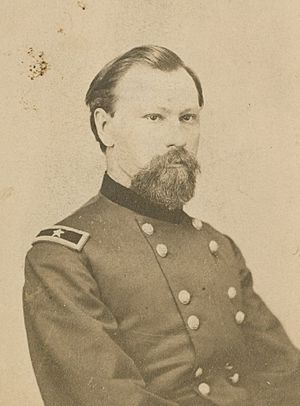Benjamin Sweet facts for kids
Quick facts for kids
Benjamin J. Sweet
|
|
|---|---|
 |
|
| Member of the Wisconsin Senate from the 19th district |
|
| In office January 1, 1861 – January 1, 1862 |
|
| Preceded by | Samuel H. Thurber |
| Succeeded by | George A. Jenkins |
| Personal details | |
| Born |
Benjamin Jeffery Sweet
April 24, 1832 Kirkland, New York, U.S. |
| Died | January 1, 1874 (aged 41) Washington, D.C., U.S. |
| Resting place | Rosehill Cemetery Chicago, Illinois |
| Spouses |
|
| Children |
|
| Parents |
|
| Military service | |
| Allegiance | |
| Branch/service | Union Army |
| Years of service | 1861–1865 |
| Rank | |
| Commands | 21st Reg. Wis. Vol. Infantry |
| Battles/wars | American Civil War |
Benjamin Jeffery Sweet (born April 24, 1832 – died January 1, 1874) was an important American figure. He was a lawyer, a politician, and a brave officer in the Union Army during the American Civil War. He served in the Wisconsin State Senate. He also worked for the U.S. government as a Deputy Commissioner of Internal Revenue.
Sweet is also known for his role in the history of women's rights. He helped write a document for the town of Lombard, Illinois. This document said that "all citizens" could vote. In 1891, a woman named Ellen A. Martin used this rule to vote. This happened 29 years before women across the U.S. gained the right to vote. His two daughters, Ada Celeste Sweet and Winifred Bonfils, also worked hard for women's rights.
About Benjamin J. Sweet
Benjamin Jeffery Sweet was born on April 24, 1832, in New York City. He later moved to Chilton, Wisconsin. He passed away on January 1, 1874. Sweet is buried at Rosehill Cemetery in Chicago, Illinois.
He had two famous daughters. Ada Celeste Sweet was a social reformer. She was a pioneer for women working in government jobs. His other daughter, Winifred Bonfils (born Martha Winifred Sweet), became a journalist and helped many people.
Sweet's Political Work
Benjamin Sweet was elected to the Wisconsin State Senate. This is a part of the government that makes laws for Wisconsin. Later, he worked for the United States government. From 1872 until his death, he was the Deputy Commissioner of Internal Revenue. This job involved managing government money.
Sweet's Military Service
When the American Civil War began, Benjamin Sweet joined the Union Army. On July 16, 1861, he became a major in the 6th Wisconsin Infantry Regiment. He was promoted to lieutenant colonel on September 17, 1861.
On September 5, 1862, Sweet became a colonel. He was given command of the 21st Wisconsin Volunteer Infantry Regiment. During the Battle of Perryville in Kentucky, he led his soldiers bravely. Even though he was sick with malaria, he fought until he was badly wounded in his right arm. This injury left his arm unable to move for the rest of his life. Sweet left the army on September 8, 1863, because of his injury.
After recovering, Sweet was given a new role. On September 25, 1863, he became a colonel in the Veteran Reserve Corps. He was put in charge of Camp Douglas, a prison camp in Chicago, Illinois. This camp held soldiers from the Confederate States Army.
Sweet was praised for finding and stopping a secret plan. Spies from the Confederacy wanted to free prisoners from Camp Douglas. They also planned to attack Chicago. Sweet's actions prevented this attack. For his efforts, the United States Department of War thanked him. On December 12, 1864, President Lincoln honored Sweet. He gave him the special rank of brevet brigadier general.
Sweet left the army for good on September 19, 1865. He died suddenly in 1874.
 | Calvin Brent |
 | Walter T. Bailey |
 | Martha Cassell Thompson |
 | Alberta Jeannette Cassell |

